
The 2015 GLI International Summer School brought together more than 100 trade union activists from over 30 countries across the world to Northern College in Barnsley, UK, to discuss the salient issues and questions facing the international trade union movement. Participants grappled with a range of topics from “big picture” trends in global capitalism, to questions about how to organise workers who have been traditionally excluded from trade union structures – from sex workers in Europe to domestic workers in South Africa and home-based workers in Pakistan.
The School culminated in the adoption of a Summer School ‘Living Manifesto. Click here to read it. This is a document which pulled together many discussion threads from the week, and from previous Summer Schools, to act as a stimulant to further discussion amongst trade unionists throughout the world.
The “Living Manifesto“, along with archived videos, blog posts and presentations from the School can be found by following the links to sessions below. We hope that this archive will provide an educational resource for all those who recognise the pressing need for the debates of the Summer School to continue and to develop… GLI is hugely thankful to the School’s participants and the staff at Northern College for making the 2015 Summer School such a success.
Click links below for videos, blog posts, presentations and further reading…
Introduction to the 2015 GLI Summer School – “Come join us!”
 Short #ISS15 film – produced by the Summer School Commission
Short #ISS15 film – produced by the Summer School Commission
GLI is hugely grateful to the small team of participants who produced this short film about the 2015 Summer School. The film was produced whilst the School was taking place and provides a wonderful snapshot of topics covered, questions raised and participants’ reflections on the week.
Pre-School Briefing – A Starter Kit for International Trade Unionists
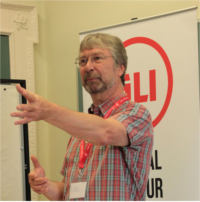 Dave Spooner, Global Labour Institute (GLI), Manchester
Dave Spooner, Global Labour Institute (GLI), Manchester
A brief guided tour around the political and organisational landscape of the movement – for all those who are new to international trade union discussions.
Plenary Presentation – Capitalism, Anti-Capitalism and the Trade Union Movement
 Asbjørn Wahl, Fagforbundet (Norwegian Union of Municipal & General Employees)
Asbjørn Wahl, Fagforbundet (Norwegian Union of Municipal & General Employees)
Asbjørn offers some thoughts on capitalism, globalisation, crises, and neoliberalism; poses the question of “who gained most from the ‘social pact’ of the post-war era?” and argues the case for a re-politicised trade union movement.
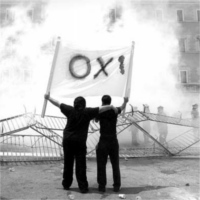 Discussion with Dikaios Psikakos (Solidarity4All) & Leonie Sharp (Society of Union Employees, UK)
Discussion with Dikaios Psikakos (Solidarity4All) & Leonie Sharp (Society of Union Employees, UK)
Dikaios introduces the Greek grassroots resistance and solidarity organisation ‘Solidarity 4 All’, while Leonie gives a critical overview of the Greek trade unions role in, and response to, the ongoing crisis.
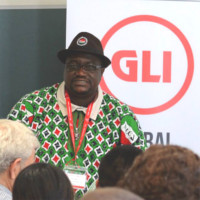 Assaf Adiv, WAC-MAAN, Israel; Vasco Pedrina, GLI Geneva / UNIA, Switzerland; Hui Xu, Migrant Workers Service Centre, China; Baba Aye, Medical & Health Workers’ Union, Nigeria
Assaf Adiv, WAC-MAAN, Israel; Vasco Pedrina, GLI Geneva / UNIA, Switzerland; Hui Xu, Migrant Workers Service Centre, China; Baba Aye, Medical & Health Workers’ Union, Nigeria
Four presentations on the state of the labour movement in four different countries/regions of the world: Israel, Europe, China and Africa.
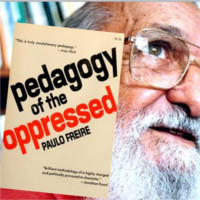 Introduction by Dave Spooner, GLI Manchester
Introduction by Dave Spooner, GLI Manchester
How should trade unions organise workers? Dave Spooner begins to answer this question with a lively history of the different models of organising, and explaining the debate that still rages between different schools of methodology, most notably the schools of ‘active learning’ and the ‘new organising model’.
 Introduced by Ewa Jasiewicz, Unite the Union
Introduced by Ewa Jasiewicz, Unite the Union
Ewa Jasiewicz recounts her time organising with workers in Iraq and Palestine before moving on to discuss in more detail the ongoing campaigns, ideas and methods employed by the Unite London Hotel Workers Branch.
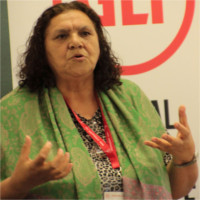 Ume Laila Azhar, HomeNet Pakistan; Myrtle Witbooi , International Domestic Workers Federation; Thierry Schaffhauser, Syndicat du Travail Sexuel (STRASS)
Ume Laila Azhar, HomeNet Pakistan; Myrtle Witbooi , International Domestic Workers Federation; Thierry Schaffhauser, Syndicat du Travail Sexuel (STRASS)
Three presentations on the topic of “organising informal workers” with speakers from Pakistan, South Africa and France: Pakistan: organising home-based and domestic workers; South Africa: organising domestic workers; France: organising sex workers.
 John Hilary, War on Want, UK
John Hilary, War on Want, UK
John Hilary talks about the threats posed by new corporate-fueled free trade agreements such as the Transatlantic Trade and Investment Partnership (TTIP), the Trans-Pacific Partnership (TPP), and the Trade in Services Agreement (TISA). He argues: “free trade agreements are fantastic if you’re a transnational corporation, and pretty rubbish if you’re anyone else.”
 Menaha Kandasamy, Ceylon Red Flag Union, Sri Lanka & Fatima Aguado, Workers’ Commissions, (CC.OO), Spain.
Menaha Kandasamy, Ceylon Red Flag Union, Sri Lanka & Fatima Aguado, Workers’ Commissions, (CC.OO), Spain.
Speakers from Sri Lanka, Spain and the UK address the often hotly debated topic of union and party relationships – if, how and when should trade unions affiliate to political parties.
 Sean Sweeney, Trade Unions for Energy Democracy & Chris Baugh, Public & Commercial Services Union, UK
Sean Sweeney, Trade Unions for Energy Democracy & Chris Baugh, Public & Commercial Services Union, UK
Sean Sweeney and Chris Baugh make a very convincing case for the involvement of the labour movement in the struggle for energy democracy.
The Housing Assembly – Decent Housing for All
 Faeza Meyer & Josie Abrahams, Housing Assembly, South Africa
Faeza Meyer & Josie Abrahams, Housing Assembly, South Africa
Faeza Meyer and Josie Abrahams, two women housing activists from the South African social movement the Housing Assembly, join the Summer School as part of their UK speaker and documentary screening tour hosted by War on Want.
 Bishnu Lamsal, General Fedn. of Nepalese Trade Unions (GEFONT); Stephanie Luce, Murphy Institute for Worker Education, City University of New York; Derek Keenan, Strathclyde University
Bishnu Lamsal, General Fedn. of Nepalese Trade Unions (GEFONT); Stephanie Luce, Murphy Institute for Worker Education, City University of New York; Derek Keenan, Strathclyde University
‘Socialism’, ‘feminism’ and ‘syndicalism’ are central concepts for the labour movement. But do we actually mean the same things when we speak about these issues? As a basis for discussion, three presenters offered their perspectives on socialism, feminism and syndicalism.
 Daniel Bertossa , Public Services International (PSI); Ambet Yuson, Building & Woodworkers International (BWI); Stuart Howard, International Transportworkers Federation (ITF); Christy Hoffman, Union Network International (UNI)
Daniel Bertossa , Public Services International (PSI); Ambet Yuson, Building & Woodworkers International (BWI); Stuart Howard, International Transportworkers Federation (ITF); Christy Hoffman, Union Network International (UNI)
Introduced by Dan Gallin, GLI Geneva, speakers from four Global Union Federations discuss this fundamental question.
Book Launch – “Struggle in a time of crisis”
Book launch with Nicolas Pons-Vignon, chaired by Dan Gallin
“Struggle in a time of crisis” brings together essays by an array of distinguished global contributors who are devoted to working with labour movements and their allies around the world to stimulate debate about the challenges facing labour groups and activists amid increasing globalization.
An International Summer School Manifesto?
 Discussion led by the Summer School Commission.
Discussion led by the Summer School Commission.
The Summer School Commission, a group of younger/less experienced participants, lead a discussion to present and debate the “Living Manifesto” which has been developed by the Commission throughout the week.

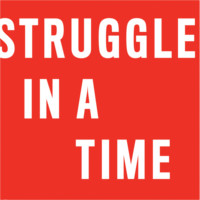
One reply on “”
[…] How many people, even those who are union members, know anything much about what the trade unions do internationally? Dipping into union branch pockets to donate a few pounds to a solidarity campaign is one thing. But are the unions – here in the UK and across the world – doing enough to respond to and mobilise the energy of the working class, particularly the young who are fearful of the decades ahead and agitating to create something vastly better for themselves and everyone? For the past four years the Global Labour Institute (GLI) has been running an International Summer School to stimulate greater discussion and interaction among trade unionists internationally. Held at the workers' education venue Northern College in South Yorkshire, it brings together young trade union activists from across the world with a number of highly experienced trade union leaders, along with representatives from other types of workers' organisations and a smattering of labour educators and researchers. Over five days they get to discuss the key issues of our times and how the trade union movement is – or should be – responding. Democracy at work The first International Summer School was held in 2012, and there have been three more each July since then. At each one, some 100 participants from more than 30 countries attend. As the word has spread, more are keen to be there, but the GLI keeps the number limited so that real, lively interactions can take place. They also restrict the number of British participants, so the school stays truly international. From among the global unions, the 2015 school had leaders and activists from the food workers' IUF, building and woodworkers' BWI, transport workers' ITF, service workers' UNI, public sector workers' PSI, and domestic workers' IDWF. For those who are not in the room, there is live video streaming, blog posts, and a Twitter feed. Each year, the GLI has been extending the social media reach of the school, working closely with Union Solidarity International. For 2015, it was estimated to be over 200,000. There's no big financial backing. This does mean that the school can only run in one language, English. Meanwhile, Unite in the UK pays for the accommodation and meals at the college. Some other unions let their officers contribute in-kind help with organising the event. The school could not happen without voluntary support from friends and colleagues too. One important thing is how the week is run. While each day there are presentations and panel discussions by people with experience on particular subjects, there is no way that those higher up the hierarchy are there to tell the others what to think, say or do. Rather, a key aim is to put the younger activists at the heart of the week. It is a chance for them to gain confidence in the issues, learn more about the international activities in which their unions are involved, and put forward their ideas for what needs to be done better to union leaders who come because they are prepared to listen. All through each day, the meeting breaks off into dynamic discussion groups on each subject. And, to give them some form of 'final say', the younger activists form a commission which meets every evening and on the final day presents their recommendations in the form of a 'Living Manifesto'. This year's discussions and conclusions The latest developments in global neoliberal capitalism are at the heart of the discussions. Previous schools have discussed the way that capitalism bounced back after the financial crash of 2007-8, and the changing nature of corporations such as their 'financialisation'. Now activists around the world are abuzz about the trade deals being negotiated in secret, such as the TTIP, all intended to strengthen even further the dominance of big capital by allowing it to operate without hindrance from social, labour or environmental constraints. So where are the unions in this development? In the opening session, Asbjorn Wahl, a Norwegian trade unionist who also holds prominent positions in the international transport workers' ITF, voiced his concerns, shared by many, that the labour movement needs a radical shift, to regain control over the political narrative of the economic crisis, and proactively use it to disarm the proponents of neoliberalism. Perhaps unsurprisingly, the manifesto agreed with him. Unions have also come to distance themselves from the wider working class by prioritising their own members, largely those in formal employment. Globally, however, those with 'jobs' have never been the majority of the working poor. Far more depend on the informal economy for their livelihoods. In recent years, such informal workers have been increasingly organising themselves. At the school this year were, for example, representatives of organisations of domestic workers in South Africa, home-based workers in Pakistan, and sex workers in France. Even standard union members – those with 'jobs' – are more and more being employed on precarious terms: short-term, part-time, zero hours, 'apprentices', seasonal, etc. The 'formal' and the 'informal' are merging. The manifesto reflects this with a call on unions to reform their constitutions and structures so that they can represent and organise all workers including the informal, precarious, unemployed and migrant ones. A return to politics may well be needed. But what does this mean, for example, for unions' relationships to political parties? The answer is not simple, as unions around the world have very different political histories and relationships, and organisational structures. Many union members tend to assume that their model of trade unionism is pretty much universal, which is not the case. Whatever structures exist, the school participants were clear they want their unions to have financial and political autonomy, and exercise far greater transparency and accountability to their members. The manifesto also reflects the participants' desire for the trade unions to rebuild themselves from below, and do more to 'build truly global solidarity movements using horizontal strategies, and engage with broader social justice movements, community groups and campaigns'. As an example of such possible alliances, among the guests giving an evening presentation were representatives of the Housing Assembly in South Africa which campaigns against housing poverty there, on a UK tour hosted by War On Want. Also, being at best 'blanked' by the mainstream media, unions must take advantage of social media to 'animate the invisible', as Unite organiser Ewa Jasiewicz put it. As for climate change, as the manifesto notes, this 'remains on the margins of the union agenda'. In fact, the 2015 school met at a seminal moment for the British union movement. The GMB had just signed a 'charter' with the gas industry body UKOOG, while others such as PCS, Unite and UCU have issued statements opposing fracking and encouraging members to join in 'Frack Free' demonstrations. The GLI body in the USA – Trade Unions for Energy Democracy (TUED) – promotes these issues in the international labour movement. As TUED's Sean Sweeney said, simply integrating renewable energy into the neoliberal framework is not the solution. We need much more discussion within unions here and across the world on how to bring about a just and fair transition to renewable energy, putting workers’ interests at the heart of the debate and bringing energy generation into public ownership. The issues and debates are huge. This is a small snapshot of what happened across five days at Northern College. Videos, presentations and guest blogs from the sessions are available here. […]